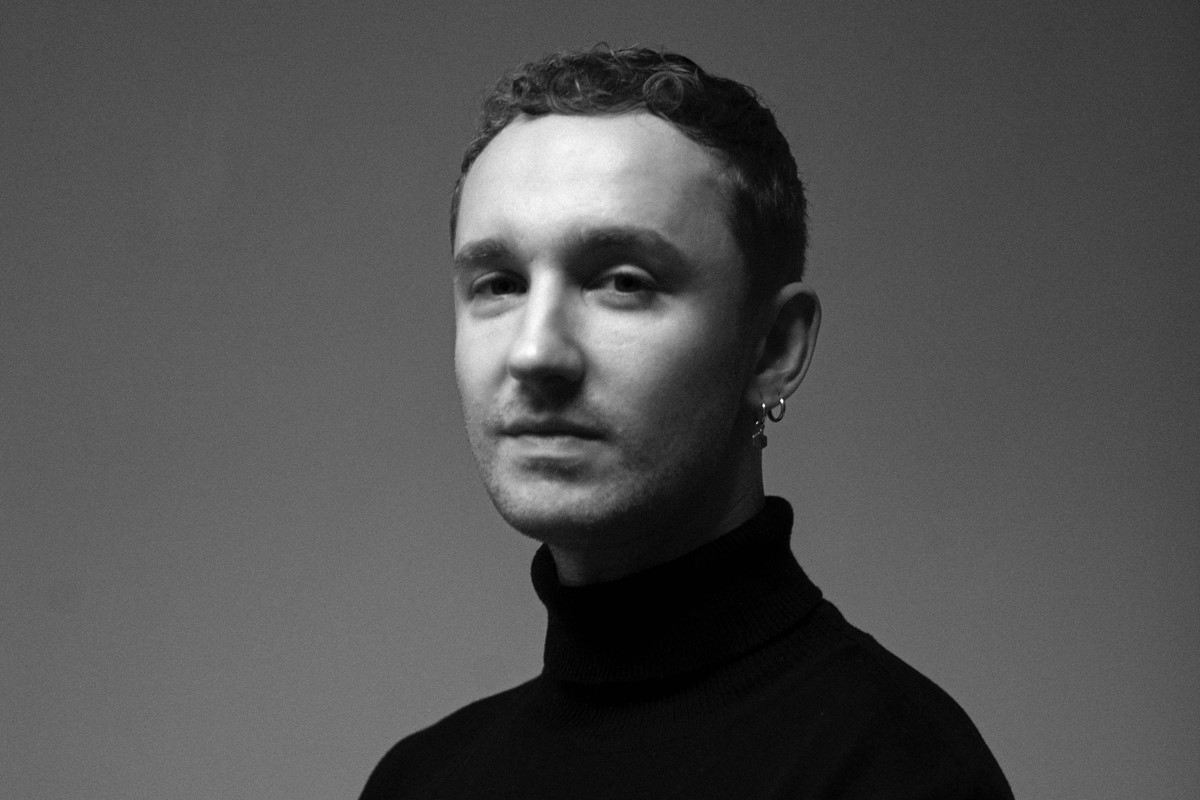
Rewrite
Lead ImageCurtis GarnerCourtesy of Verve Books
Curtis Garner says he always wanted to write “a Grindr novel“ because, like many of us, he has mixed feelings about the queer hookup app. “Being a super-user myself,“ he says with a knowing laugh, “I was just so interested in how this platform gives people licence to treat others badly – to be racist, femmephobic or just plain cruel.“ Garner’s moving debut novel Isaac unfolds through the widening eyes of its title character, a bright but naive 17-year-old from south London who is using Grindr to explore his sexuality for the first time.
“Isaac is really vulnerable and impressionable,“ Garner says when we meet in an east London coffee shop. The Cornwall-born author moved to the capital when he was 18 to study Creative Writing and English Literature at the University of Greenwich, so he knows Isaac’s patch of south London well. Since he graduated in 2017, Garner has worked in publishing while building towards writing a book of his own. “I wanted it to have a teenage protagonist because adolescence is all about incoherence and not understanding anything about yourself,“ Garner says. “I think that Isaac’s first sexual experiences on Grindr heighten the fact he doesn’t know what he’s doing or the kind of person that he wants to be.“
Garner’s novel really captures the blithe bigotry of Grindr – on the very first page, Isaac encounters a profile specifying “no fur no fat no fem (sic)“. But it isn’t just a Grindr novel. Instead, it follows Isaac as he enters into a horribly toxic relationship with an older man, 28-year-old Harrison, whose confident demeanour conceals a mean streak and layers of self-deception. “He’s very staunch in his opinions and how he sees the world, and he’s very performatively angry,“ Garner says. “And even though he thinks Isaac is stupid, Isaac is the clever one because he’s so inquisitive. That’s what wisdom is to me – asking questions.“
Along the way, Isaac grapples with body dysmorphia that spawns an eating disorder, and watches the breakdown of his hardworking mother’s marriage to Leon, the stepfather who raised him. At times, Garner’s writing is so wrenchingly tender that it will remind you of glorious (or otherwise) moments from your own misspent youth. Elsewhere, Isaac’s behaviour will make you roll your eyes because it’s avoidable but all too relatable at the same time. Though he understands his best friend Cherish intrinsically, he can’t seem to help hurting her feelings.
Here, Garner talks about some of the key themes in Isaac, one of 2024’s most captivating and evocative debut novels.

Nick Levine: Now that you’ve finished it, do you think of Isaac as a coming-of-age novel?
Curtis Garner: I do, but I’ve struggled with that term recently. Someone said to me – an older guy, a friend of a friend – that his issue with the term is that it suggests you only come of age once in your life. [It suggests] you have this Bildungsroman moment and then the rest of your life is a happy ending where you’re this fixed, wonderful human being. But of course, this doesn’t happen – you make mistakes for your whole life. His point was that your whole life is like a coming-of-age novel, which is a bit cheesy, but also really true.
NL: Isaac is 17 and his boyfriend Harrison is 28. What made you want to write a relationship with quite a significant age gap?
CG: At first I wanted the novel to be more episodic: Isaac having all these hook-ups and then perhaps learning something. But then about halfway through [the writing process], I was thinking a lot about my own relationships and how I felt at Isaac’s age. Just to caveat, this isn’t a novel about me, but there are things that I suppose are borrowed from me.
When I was 18 or 19, I was dating this guy who was about ten years older and who massively struggled with intimacy. I remember thinking it was like a game – that one day I’d crack him. And then one day, we were watching The Crown on a MacBook in bed and he just rolled onto my chest and fell asleep.
I remember thinking, “I’ve cracked him”, but of course I hadn’t. But that [inspired] a really important element of Isaac and Harrison’s relationship – that Isaac ultimately thinks he can rescue Harrison in some way. There’s a bit in the book where Harrison says to Isaac: “You can’t choose how you want someone to love you.” I think I wanted to write the age gap to show the difference between how a young person thinks and how an older person thinks.
NL: Do you think age gaps in queer relationships are more accepted in a way? Not just because of the twink-daddy dynamic, but because queer people are bonded by life experiences that don’t necessarily relate to age.
CG: I don’t want to be too “daddy issues” about it, but I do think sexual politics are a big factor – there definitely can be fetishes involved. But speaking personally, I grew up in a really provincial part of the world, and I remember coming to Dalston Superstore ten years ago and being so enamoured to be in this place where queer people congregate and celebrate each other. At that age you kind of crave a queer mentor, a queer role model, and I do think that’s a huge part of it too.
“There’s a bit in the book where Harrison says to Isaac: ‘You can’t choose how you want someone to love you.’ I think I wanted to write the age gap to show the difference between how a young person thinks and how an older person thinks” – Curtis Garner
NL: Some novels with queer male protagonists are rightly criticised for lacking three-dimensional female characters. But Isaac has two: his mum and his best friend Cherish. Were you conscious of making sure they didn’t just exist in relation to him?
I’m the clichéd gay man in that I’m obsessed with my mum. At family gatherings, when the blokes would go off to the kitchen for a beer, I’d stay in the living room with my mum and my nan and their friends. Women to me are synonymous with safety and comfort in a way I just don’t feel with men – even now – so writing those characters came quite easily to me.
Speaking personally, I’ve always found that women exhibit their injuries less than men. When Leon cheats on Isaac’s mum, she sort of gets on with it, but he tries to turn around and say: “Well, it’s because you did this.” I hate quoting from my own novel again, it sounds so cunty, but there’s a bit where Isaac says, essentially, that men will shout about it when they’re wronged, whereas women have long resigned themselves to the fact that they will always be wronged. That’s something that I felt was really important to write.
NL: Sorry to end on a cheesy question, but what do you hope people take away from Isaac?
CG: No, I love a cheesy question, because I can give a cheesy answer! I think I hope that queer people read it and realise that they’re allowed to be fallible. The world has sort of taught you that you have to fit in this box of being a virtuous person all the time. But you’re also a three-dimensional person with idiosyncrasies. You can make mistakes and do stupid things, and sometimes you’ll be selfish and cruel and even a “bad person”. But actually, all of that’s OK, because it’s just being human.
Isaac by Curtis Garner is published by Verve Books, and is out now.
in HTML format, including tags, to make it appealing and easy to read for Japanese-speaking readers aged 20 to 40 interested in fashion. Organize the content with appropriate headings and subheadings (h1, h2, h3, h4, h5, h6), translating all text, including headings, into Japanese. Retain any existing
tags from
Lead ImageCurtis GarnerCourtesy of Verve Books
Curtis Garner says he always wanted to write “a Grindr novel“ because, like many of us, he has mixed feelings about the queer hookup app. “Being a super-user myself,“ he says with a knowing laugh, “I was just so interested in how this platform gives people licence to treat others badly – to be racist, femmephobic or just plain cruel.“ Garner’s moving debut novel Isaac unfolds through the widening eyes of its title character, a bright but naive 17-year-old from south London who is using Grindr to explore his sexuality for the first time.
“Isaac is really vulnerable and impressionable,“ Garner says when we meet in an east London coffee shop. The Cornwall-born author moved to the capital when he was 18 to study Creative Writing and English Literature at the University of Greenwich, so he knows Isaac’s patch of south London well. Since he graduated in 2017, Garner has worked in publishing while building towards writing a book of his own. “I wanted it to have a teenage protagonist because adolescence is all about incoherence and not understanding anything about yourself,“ Garner says. “I think that Isaac’s first sexual experiences on Grindr heighten the fact he doesn’t know what he’s doing or the kind of person that he wants to be.“
Garner’s novel really captures the blithe bigotry of Grindr – on the very first page, Isaac encounters a profile specifying “no fur no fat no fem (sic)“. But it isn’t just a Grindr novel. Instead, it follows Isaac as he enters into a horribly toxic relationship with an older man, 28-year-old Harrison, whose confident demeanour conceals a mean streak and layers of self-deception. “He’s very staunch in his opinions and how he sees the world, and he’s very performatively angry,“ Garner says. “And even though he thinks Isaac is stupid, Isaac is the clever one because he’s so inquisitive. That’s what wisdom is to me – asking questions.“
Along the way, Isaac grapples with body dysmorphia that spawns an eating disorder, and watches the breakdown of his hardworking mother’s marriage to Leon, the stepfather who raised him. At times, Garner’s writing is so wrenchingly tender that it will remind you of glorious (or otherwise) moments from your own misspent youth. Elsewhere, Isaac’s behaviour will make you roll your eyes because it’s avoidable but all too relatable at the same time. Though he understands his best friend Cherish intrinsically, he can’t seem to help hurting her feelings.
Here, Garner talks about some of the key themes in Isaac, one of 2024’s most captivating and evocative debut novels.

Nick Levine: Now that you’ve finished it, do you think of Isaac as a coming-of-age novel?
Curtis Garner: I do, but I’ve struggled with that term recently. Someone said to me – an older guy, a friend of a friend – that his issue with the term is that it suggests you only come of age once in your life. [It suggests] you have this Bildungsroman moment and then the rest of your life is a happy ending where you’re this fixed, wonderful human being. But of course, this doesn’t happen – you make mistakes for your whole life. His point was that your whole life is like a coming-of-age novel, which is a bit cheesy, but also really true.
NL: Isaac is 17 and his boyfriend Harrison is 28. What made you want to write a relationship with quite a significant age gap?
CG: At first I wanted the novel to be more episodic: Isaac having all these hook-ups and then perhaps learning something. But then about halfway through [the writing process], I was thinking a lot about my own relationships and how I felt at Isaac’s age. Just to caveat, this isn’t a novel about me, but there are things that I suppose are borrowed from me.
When I was 18 or 19, I was dating this guy who was about ten years older and who massively struggled with intimacy. I remember thinking it was like a game – that one day I’d crack him. And then one day, we were watching The Crown on a MacBook in bed and he just rolled onto my chest and fell asleep.
I remember thinking, “I’ve cracked him”, but of course I hadn’t. But that [inspired] a really important element of Isaac and Harrison’s relationship – that Isaac ultimately thinks he can rescue Harrison in some way. There’s a bit in the book where Harrison says to Isaac: “You can’t choose how you want someone to love you.” I think I wanted to write the age gap to show the difference between how a young person thinks and how an older person thinks.
NL: Do you think age gaps in queer relationships are more accepted in a way? Not just because of the twink-daddy dynamic, but because queer people are bonded by life experiences that don’t necessarily relate to age.
CG: I don’t want to be too “daddy issues” about it, but I do think sexual politics are a big factor – there definitely can be fetishes involved. But speaking personally, I grew up in a really provincial part of the world, and I remember coming to Dalston Superstore ten years ago and being so enamoured to be in this place where queer people congregate and celebrate each other. At that age you kind of crave a queer mentor, a queer role model, and I do think that’s a huge part of it too.
“There’s a bit in the book where Harrison says to Isaac: ‘You can’t choose how you want someone to love you.’ I think I wanted to write the age gap to show the difference between how a young person thinks and how an older person thinks” – Curtis Garner
NL: Some novels with queer male protagonists are rightly criticised for lacking three-dimensional female characters. But Isaac has two: his mum and his best friend Cherish. Were you conscious of making sure they didn’t just exist in relation to him?
I’m the clichéd gay man in that I’m obsessed with my mum. At family gatherings, when the blokes would go off to the kitchen for a beer, I’d stay in the living room with my mum and my nan and their friends. Women to me are synonymous with safety and comfort in a way I just don’t feel with men – even now – so writing those characters came quite easily to me.
Speaking personally, I’ve always found that women exhibit their injuries less than men. When Leon cheats on Isaac’s mum, she sort of gets on with it, but he tries to turn around and say: “Well, it’s because you did this.” I hate quoting from my own novel again, it sounds so cunty, but there’s a bit where Isaac says, essentially, that men will shout about it when they’re wronged, whereas women have long resigned themselves to the fact that they will always be wronged. That’s something that I felt was really important to write.
NL: Sorry to end on a cheesy question, but what do you hope people take away from Isaac?
CG: No, I love a cheesy question, because I can give a cheesy answer! I think I hope that queer people read it and realise that they’re allowed to be fallible. The world has sort of taught you that you have to fit in this box of being a virtuous person all the time. But you’re also a three-dimensional person with idiosyncrasies. You can make mistakes and do stupid things, and sometimes you’ll be selfish and cruel and even a “bad person”. But actually, all of that’s OK, because it’s just being human.
Isaac by Curtis Garner is published by Verve Books, and is out now.
and integrate them seamlessly into the new content without adding new tags. Ensure the new content is fashion-related, written entirely in Japanese, and approximately 1500 words. Conclude with a “結論” section and a well-formatted “よくある質問” section. Avoid including an introduction or a note explaining the process.


